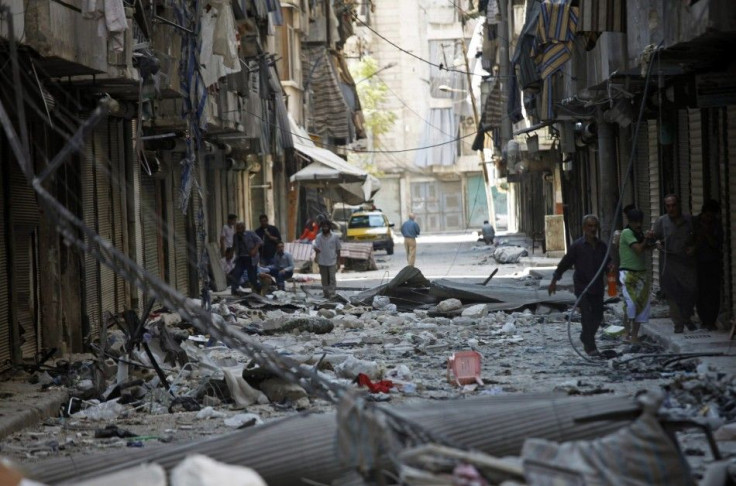Syria’s New National Coalition Gains Friends In UK, Makes Enemies In Aleppo

The newly formed Syrian opposition coalition in exile made friends as well as enemies this week, securing formal British recognition just days after being rejected by a group of Syrian rebel militias on the ground in Aleppo.
The United Kingdom has followed in France’s footsteps, becoming the second Western superpower to fully recognize the National Coalition of Syrian Revolutionary and Opposition Forces. In a Tuesday speech in front of the British Parliament, Foreign Secretary William Hague said he had met with the leaders of the new organization last week.
“On the basis of the assurances I received and my consultations with European partners yesterday, Her Majesty’s Government has decided to recognize the National Coalition of Syrian Revolutionary and Opposition Forces as the sole legitimate representative of the Syrian people,” he said.
“As the President of the National Coalition [Mouaz al-Khatib] said to me on Friday, recognition imposes responsibilities on the Coalition, and we will continue to press them to uphold their commitments.”
Other nations that now recognize the coalition both politically and diplomatically are France, Turkey, Saudi Arabia, Qatar, Bahrain, Oman, Yemen and the United Arab Emirates.
Meanwhile Italy, the United States and the European Union have all voiced support for the organization without going so far as to recognize it as a diplomatic representative of the Syrian people.
The National Coalition was cobbled together after marathon talks in Doha, Qatar earlier his month. Its members will work to organize Syria’s rebel forces into a more cohesive militia, act as a diplomatic representative for the opposition on the ground, and form a transitional government in order to promote stability once Syrian President Bashar al-Assad is ousted.
The Syrian uprising began in March of 2011. Now 20 months later, around 40,000 people have died and hundreds of thousands have been displaced. The number of refugees has soared to about 400,000, putting a strain on neighboring countries and threatening regional stability.
“What is urgently needed is a political transition to new and legitimate leadership that reflects the will of the Syrian people, and that can end the violence and begin to rebuild the country with regional and international support,” said Hague on Tuesday.
Great Britain has already spent about $US85 million on humanitarian aid for Syria’s rebels, who are poorly organized and badly outgunned by the formidable Syrian army. On Tuesday, Hague promised an additional $3 million in immediate commitments, with more to follow.
But assisting the Syrian rebellion is an intractably complicated endeavor. Fighters are loosely organized under the banner of the Free Syrian Army; no chain of command has emerged to coordinate the activities of the various militias. Religious extremists, including jihadists linked to al-Qaeda, have infiltrated the rebellion and turned the political movement into an increasingly sectarian one, pitting Syria’s majority Sunni population against minority groups.
That became increasingly clear on Sunday night, when a group of militia representatives in Aleppo, Syria’s most populous city, released a video statement disavowing the new National Coalition.
“We are the representatives of the fighting formations in Aleppo and we declare our rejection of the conspiratorial project, the so-called national alliance," said the statement, according to the Associated Press. “We have unanimously agreed to urgently establish an Islamic state and to reject any foreign project.”
The 13 rebel groups represented in the video include some influential militias like the Tawhid Brigade and the al-Nusra Front, both of which are headed up by Islamists. Al-Nusra in particular is suspected of having links to al-Qaeda.
Speaking for the National Coalition, al-Khatib responded diplomatically. “We will keep in contact with [the dissenting factions] for more cooperation in the interest of the Syrian people,” he said, according to the BBC.
These complications are a major reason why no Western country has accommodated rebel requests for weaponry, although Qatar and Saudi Arabia have both sent arms into Syria.
But with Hague’s endorsement of the National Coalition, and as more and more Syrians lose their lives to Assad’s heavily armed forces, the West is slowly warming to the idea of stronger intervention, even if it stops short of arming the rebels.
“We will not rule out any option in accordance with international law that might save innocent lives in Syria and prevent the destabilization of a region that remains critical to the security of the United Kingdom and the peace of the whole world,” said Hague.
© Copyright IBTimes 2024. All rights reserved.






















